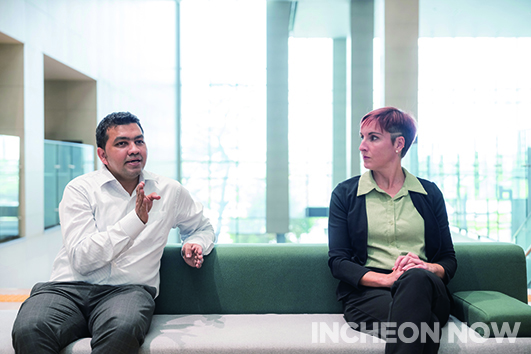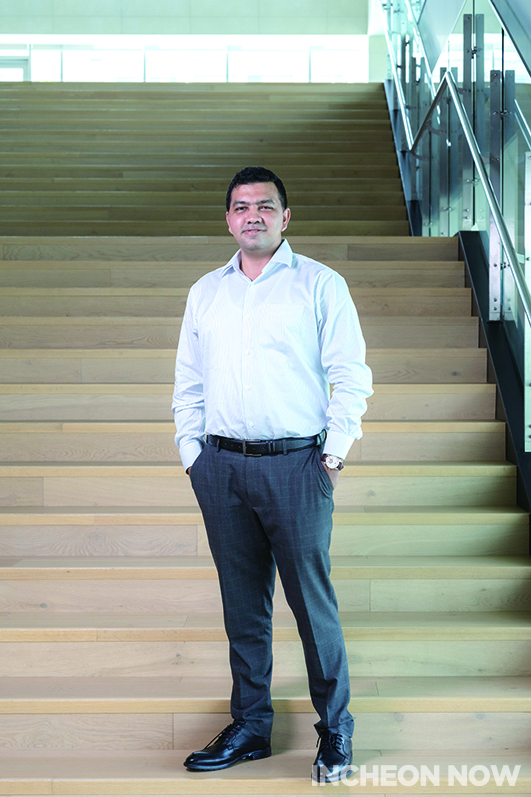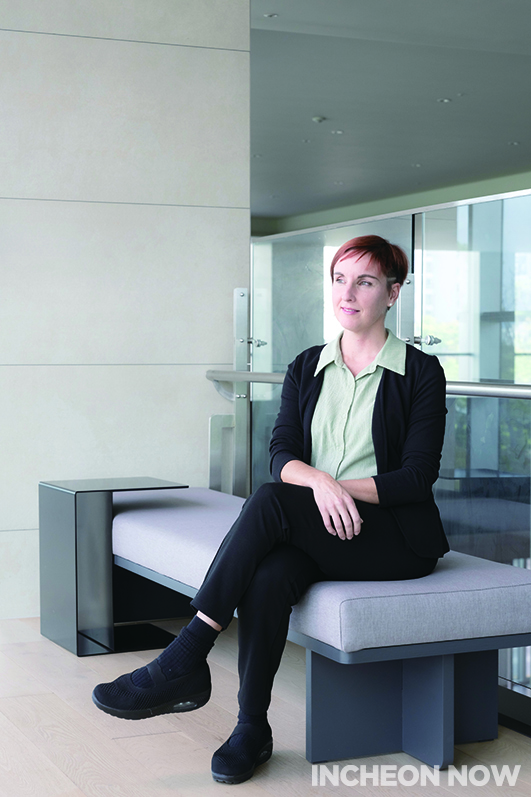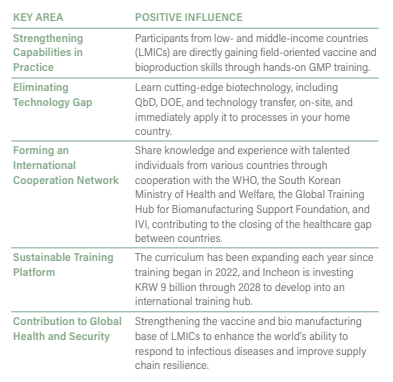Two Experts from Bangladesh and South Africa,
Md. Rezwan UI Haque & Sandra Jordaan
방글라데시아와 남아프리라공화국에서 온 두 전문가,
Md. Rezwan UI Haque & Sandra Jordaan

Learning Across Borders,
Leads to Bio Industry
Shares Their Vision for World Health and Security
국경 넘은 배움,
바이오산업으로 이어지다
세계 보건 안보를 향한 공동의 비전을 나누다.
By | Hye Jung Lee 인천나우 본지 편집위원
Infectious diseases do not respect borders. 감염병은 국경을 가리지 않는다.
This clear fact highlights the importance of developing global talent capable of producing vaccines. 이 명백한 사실은 백신 개발과 제조를 넘어, 이를 실현할 글로벌 인재 양성의 중요성을 다시금 상기시킨다.
The basic training for vaccine and biopharmaceutical production at the Global Training Hub for Biomanufacturing (GTH-B), supported by Incheon, is a step toward fostering international cooperation and future health security beyond mere technology transfer.
인천시의 지원으로 추진되는 글로벌 바이오 인력양성 허브(GTH-B)의 백신 바이오 의약품 생산공장 기본 교육은 단순한 기술 전수를 넘어, 국제 협력과 미래 보건 안보를 실현하는 여정이다.
Through the experiences of two experts from Bangladesh and South Africa who participated in the training, we examined how Incheon contributes to the global bio-ecosystem and its potential.
방글라데시와 남아프리카공화국에서 온 두 전문가의 교육 참여 경험을 통해, 인천이 세계 바이오 생태계에 기여하는 방식과 그 가능성을 들여다본다.

Md. Rezwan UI Haque is a senior executive responsible for biopharmaceutical research and development (R&D) at Healthcare Pharmaceuticals Ltd. in Bangladesh. He explained his motivation for participating in this training, saying, “While Bangladesh’s vaccine production capacity is still limited, I wanted to understand the entire cycle from planning to approval and distribution beyond simply learning about production technology.” Currently, a few companies in Bangladesh are in the fill-finish phase, but bulk vaccine production remains in its early stages of development. He mentioned that he gained practical solutions applicable to actual manufacturing processes in Bangladesh during the training, which combines theory and practice for Quality by Design (QbD), Design of Experiments (DOE), Quality Control (QC), and product development.
Md. Rezwan UI Haque는 방글라데시의 Healthcare pharmaceuticals Ltd.에서 바이오의약품 연구개발(R&D)을 담당하는 시니어 임원이다. 그는 “자국의 백신 생산 역량이 아직 제한적인 상황에서, 단순한 생산기술 습득을 넘어 기획부터 승인, 유통까지 전주기를 이해하고 싶었다”고 밝히며 이번 교육 참여 배경을 설명했다. 현재 방글라데시는 몇몇 기업이 필-피니시(Fill-Finish;충전 및 완제) 단계에 참여하고 있으나, 완제품(bulk vaccines) 생산에 있어서는 초기 단계에 머물러 있다. 그는 교육을 통해 설계 기반 품질(QbD), 실험 설계(DOE), 품질관리(QC), 제품개발, 등 이론과 실무를 연계한 교육을 받으며, 실제 자국 제조공정에 적용 가능한 구체적 해법을 얻었다고 평가한다.

Sandra Jordaan, a production manager at Cape Biologix Technologies in South Africa, returned to the training this year after participating the previous year. She said, “The depth and diversity of the course, and the collaborative discussions with experts from various countries, were quite impressive.” She added that the training directly benefited the Good Manufacturing Practice (GMP)-based production operations she oversees, particularly in areas such as product design and quality, technology transfer, and manufacturing facility design. Cape Biologix is a startup specializing in the development of recombinant proteins using plant-based expression systems, and Jordaan manages the entire process, from upstream and downstream processes to quality assurance.
남아프리카공화국의 Cape Biologix Technologis에서 생산관리자로 근무중인 Sandra Jordaan은 지난해에 이어 올해도 이 교육에 재참여했다. 그녀는 “교육과정의 깊이와 다양성, 그리고 각국 전문가와의 협업적 논의가 매우 인상적이었다”며, 제품 설계와 품질의 상관관계, 기술 이전, 제조 시설 설계 등에서 자신이 담당하는 GMP(의약품 제조 및 품질)기반 생산운영에 직접적인 도움이 되었다고 말했다. 특히 Cape Biologix는 식물기반 발현 시스템을 사용하는 재조합 단백질 개발 스타트업으로, 그녀는 상류/하류 공정에서 품질검증까지 전 과정을 총괄하고 있다.

The two participants expressed their deep impression of Incheon’s bioindustry ecosystem’s excellence. “Songdo, home to global companies like Samsung BioLogics, Celltrion, and Lotte BioLogics, is more than just a manufacturing hub. It is closely linked with incubators, research institutes, and universities centered around the Incheon Free Economic Zone (IFEZ), creating an integrated cluster that fosters an ecosystem where startups, large companies, and researchers can thrive together,” said Rezwan. Sandra also added, “The manufacturing facilities and research institutes we visited strictly followed global GMP (Good Manufacturing Practice) standards. Incheon, actively involved in international collaborative research, clinical trials, and technology transfer, truly stands out as a leading global hub for biotechnology education and innovation.”
두 참가자는 공통적으로 인천이 가진 바이오 산업 생태계의 우수성에 깊은 인상을 받았다고 말했다. “삼성바이오로직스, 셀트리온, 롯데바이오로직스 등 세계적 기업이 밀집한 송도는 단순한 제조기지 그 이상이다. IFEZ(인천경제자유구역)를 중심으로 인큐베이터와 연구기관, 대학과의 연계가 긴밀이 이루어지고 있으며, 이러한 통합된 클러스터는 벤처와 대기업, 연구자가 함께 성장할 수 있는 최적의 생태계를 만든다”고 Rezwan은 평가했다. Sandra 역시 “우리가 방문한 제조 시설과 연구기관들은 글로벌 GMP(의약품 제조 및 품질)기준을 철저히 준수하고 있었고, 국제 공동 연구와 임상실험, 기술이전이 활발이 이루어지는 인천은 바이오 교육과 혁신의 글로벌 허브로 손색이 없다”고 덧붙였다.
This training was part of the Global Training Hub for Biomanufacturing Training (GTH-B) program, jointly promoted by the World Health Organization (WHO), the Ministry of Health and Welfare (MOHW), the Global Training Hub for Biomanufacturing Training Support Foundation, and the International Vaccine Institute (IVI). Incheon will invest a total of KRW 9 billion from 2024 to 2028 to support biotechnology talent in developing countries. The program includes practical, interactive learning such as field trips to manufacturing sites, discussions among multinational talents, and strategies for addressing national health challenges, in addition to lecture-based training.
이번 교육은 세계보건기구(WHO), 보건복지부(MOHW), (재)글로벌 바이오 인력양성 허브 지원재단, 국제백신연구소(IVI)가 공동으로 추진하는 글로벌 바이오 인력양성 허브(GTH-B; Global Training Hub for Biomanufacturing Training) 사업의 일환으로 마련되었으며 인천시는 2024년부터 2028년까지 총 90억 원을 투입해 저개발국가 바이오 인재들을 지원한다. 이 과정은 강의 중심 교육을 넘어, 실제 제조 현장 견학, 다국적 인재 간 토론, 국가별 보건현안 해결 전략 모색 등 실질적인 상호 학습으로 구성돼 있다.
“Access to vaccines and the lack of infrastructure are major challenges in low- and middle-income countries (LMICs). Through this training, we can develop the capacity to design strategies and tailored health solutions suited to each country’s specific circumstances,” said Sandra. “중저소득국가(LMIC)에서는 백신의 접근성과 인프라 부족이 큰 과제입니다. 이번 교육을 통해, 각국 상황에 맞는 전략과 맞춤형 보건 솔루션을 설계할 수 있는 능력을 키울 수 있었습니다” Sandra는 말한다. Rezwan also emphasized, “Given Bangladesh’s infrastructure and human resources, Korea’s K-Bio model is the most practical reference for us. This experience provided by Incheon is not just training, but a platform for future cooperation and will serve as a collaboration foundation necessary for building a global infectious disease response network in the long term.”
Rezwan 역시 “방글라데시의 인프라와 인력을 고려할 때, 한국의 K-바이오 모델은 우리가 참고할 수 있는 가장 실제적인 사례입니다. 인천이 제공한 이 경험은 단순한 교육이 아니라, 미래 협력의 플랫폼이며 장기적으로 글로벌 감염병 대응망을 구축하는 데 필요한 협력 플랫폼으로 작용할 것입니다”라고 강조했다.
Incheon is strengthening its role as a hub for bioproduction and as a strategic platform for developing global biotalent. This foundational training for vaccine bio-production, which includes collaboration with international organizations, integration of infrastructure and educational content, and the creation of a practical global network, acts as the foundation for a sustainable partnership in global public health security beyond short-term training.
이제 인천은 바이오 생산의 거점이 아닌 글로벌 바이오 인재 양성의 전략적 플랫폼으로서 그 위상을 공고히 하고 있다. 국제기구와의 협력, 인프라와 교육 콘텐츠의 융합, 그리고 실질적인 글로벌 네트워크 형성이라는 삼박자가 어우러진 이번 백신 바이오 생산공정 기본 교육은 단순한 단기 교육을 넘어, 세계 공중 보건 안보를 위한 지속가능한 파트너십의 서막이라 할 수 있다.
<Key Message>
Positive Influence of GTH-B Training on LMIC (Low- and Middle-Income Countries)
GTH-B 교육이 LMIC(Low- and Middle-Income Countries)에 미치는 긍정적인 영향
